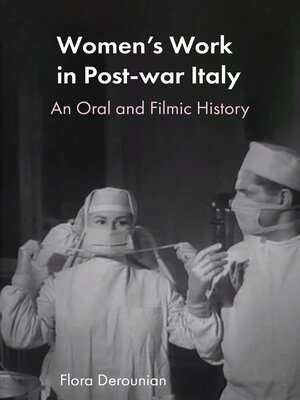Women's Work in Post-war Italy
ebook ∣ An Oral and Filmic History · Trajectories of Italian Cinema and Media
By Flora Derounian

Sign up to save your library
With an OverDrive account, you can save your favorite libraries for at-a-glance information about availability. Find out more about OverDrive accounts.
Find this title in Libby, the library reading app by OverDrive.



Search for a digital library with this title
Title found at these libraries:
| Library Name | Distance |
|---|---|
| Loading... |
Italy's 1948 constitution states that Italy is a 'republic founded upon work'. This book explores women's labour following World War Two and Italy's new republic. It focuses its enquiry on three sectors: agriculture (rice weeders), fashion (seamstresses), and religious work (nuns). It studies original oral history interviews and compares women's own words with their representation in film.
In Italy, both war and national reconstruction have typically been framed as masculine undertakings. This book shifts that frame to investigate the labour that Italian women were doing at this critical time of political, social, and ideological change. By examining (filmed) oral history interviews and postwar fiction films, the book brings a vivid, engaging, and cross-disciplinary account of women's work.
Historical studies of Italian women's work in this period are scarce, short, and almost never in English; this work addresses that critical gap. Film histories almost invariably study women for their beauty and on-screen sexuality; this work critiques and moves beyond this bias. Oral history studies aim to give voice to the under-represented; this book shares that goal.
The book is interested in how women's work was viewed by society and by women workers themselves. Critical analysis of films produced between 1945 and 1965 reveals tensions around women workers' financial, sexual, intellectual, and spatial independence. Oral histories reveal little-discussed professions and women's experiences in the workplace. These interviews expose the profound difference work made to women's lives, and the joys and dilemmas of this difference.







